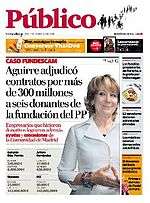Público (Spain)
|
| |
|
Front page, 1 June 2009 | |
| Type | Daily newspaper |
|---|---|
| Owner(s) | Mediapro |
| Editor | Carlos Enrique Bayo[1] |
| Founded | 26 September 2007 |
| Political alignment |
Left-wing Republicanism |
| Ceased publication | (print) 24 February 2012 |
| Headquarters |
Calle Caleruega Nº. 102, 1ª Planta, Madrid, |
| Circulation | 7.592.279 unique visitors each month (online)[2] |
| Website | http://www.publico.es |
Público (Spanish for "Public") is a Spanish online newspaper. It was published as a print daily newspaper between 2007 and 2012. When the print version folded, the newspaper continued online.
History and profile
Público was established in September 2007.[3][4] The founder is Jaume Roures, head of Mediapro.[3] One of only two national left-wing papers,[5][6] the paper had a harder-left editorial line than the circulation leader, El País.[7] Público also aimed at a younger readership.[8] The paper was two-thirds the length of its competitors and its price, initially only 50 cents, was less than half. The paper's original press run was 250,000 daily.[9]
After making financial losses for several years, and facing a €9 million deficit, Público folded its print edition in February 2012.[8][7] In its last year, the paper was the ninth-largest general-interest newspaper in Spain and the fifth-largest of those headquartered in Madrid.[10]
The parent company Mediapro[6] undertook to continue to publish the website publico.es,[7] which as at 2014 is still active as an on-line newspaper.[2][11]
Editors
- Ignacio Escolar (2007-9). Escolar, who had previously worked in Informativos Telecinco, Localia and La Voz de Almería, went on to work for a new online newspaper eldiario.es.
- Félix Monteira (2009-10), the second editor, left to take up a government appointment.[12]
- Jesús Maraña was the last editor of the print edition.
- Carlos Enrique Bayo (2012)
See also
References
- ↑ "Carlos Enrique Bayo". Retrieved 20 August 2012.
- 1 2 Público’ sigue creciendo y marca otro récord. Retrieved 26 December 2014.
- 1 2 "Country Profile: Spain". Institute of Media and Communications Study. Retrieved 21 February 2015.
- ↑ Rosario de Mateo; Laura Bergés; Anna Garnatxe (2010). "Crisis, what crisis? The media: business and journalism in times of crisis". tripleC. 8 (2). Retrieved 18 December 2014.
- ↑ Andy Robinson (21 February 2013). "Political Corruption and Media Retribution in Spain and Greece". The Nation. Retrieved 9 August 2014.
- 1 2 Esteban Romero-Frías; Liwen Vaughan (2012). "Exploring the Relationships Between Media and Political Parties Through web Hyperlink Analysis: The Case of Spain". Journal of the American Society for Information Science and Technology. 63 (5): 967–976. doi:10.1002/asi.22625. Retrieved 18 December 2014.
- 1 2 3 Giles Tremlett (24 February 2011). "Spanish Newspaper Público to Stop Printing". The Guardian. London. Retrieved 26 February 2012.
- 1 2 "Spain. Freedom of the Press 2013". Freedom House. Retrieved 1 January 2015.
- ↑ Victoria Burnett (22 October 2007). "A New Daily Starts in Spain, Aiming for the Young, Left-Leaning Reader". The New York Times.
- ↑ Figures covering July 2010 to June 2011 in Spain, Oficina de Justificación de la Difusión. Retrieved 28 January 2012.
- ↑ Anne Penketh; Philip Oltermann; Stephen Burgen (12 June 2014). "European newspapers search for ways to survive digital revolution". The Guardian. Paris, Berlin, Barcelona. Retrieved 7 January 2015.
- ↑ "Público" cambia de director (Spanish)
